
Eclipse Talks
Build vs Buy: Should you hire your CRO talent or get it off the shelf?
Ellie Hughes
Head of Consulting
In this spicy talk topic, Ellie will give you a real opinion on whether you should build out your team in-house, choose to buy off the shelf by going outside, or one of the many hybrid models in between.
Building the perspective of both the buyer (in-house) and the seller (agencies or contractors feeling the pinch right now) should attend in order to see how they can meet in the middle when everyone is worried about recruitment costs, how to keep their people values and impulsive choices by Hippos.
What is the Digital Skills Gap?
The digital skills gap refers to the shortfall between the number of available workers with advanced data, analytics, and technology skills—and the sharply rising demand from UK employers seeking those skills for digital transformation, experimentation, and data-led growth.
A 2024 government review showed that 7.5 million people, or 18% of UK adults, lacked the essential digital skills that are needed for the workplace.
A further research report by Future Now found that 59% of the UK’s workforce (23.4 million people) are unable to do all 20 digital tasks that industry and government have defined as essential for work.
The crisis of talent in CRO and Data
We have a Talent Crisis
We need people who are great at Data and CRO
The pool is small already
This crisis is made worse by how quickly tech and skills requirements are changing
Consequences
Hiring takes a lot longer
Salary expectations are higher
The smaller you are, the harder it is to compete
Up-skilling is not fast enough or in-depth enough vs how fast the industry moves
And yet....
We still debate into the wee hours whether we should in-house or outsource something as complex as CRO and Data
Case Study 1
Optimisation Leader
Enabling a well-known ecomm brand selling B2C retail and personalised retail
Point of View
We brought in an agency to do CRO, and nothing seemed to work out.
They preferred to impose a way of working which slows down the in-house team.
They forced us to pay for tools we could not use or maintain long-term
After 3 months, the produced a lot of winners but were not as successful as the in-house team - quality or size of wins
Result for client: Negative

Result for partner: Negative

What went wrong?
Mis-alignment in ways of working
Agency behaved inflexibly
Client was too mature for this agency
Lack of ROI perception more related to the waste produced
Getting out of the POC contracts for agency and tooling was hard work
Case Study 2
Digital Commerce Leader
Creating highly optimised campaigns and personalised content for a large B2B, B2C + B2B2C travel website
Point of View
We’ve just launched this amazing site but nothing is personalised.
We have no joined up customer view, our web analytics is a mess and split between a legacy and new platform.
The BI/data team say web is “on the roadmap” - but two years from now
I made the case internally to get the skills we need while we justify a bigger programme.
We work with a really great onshore team who “get” our data and offer skills we don’t have.
Result for client: Positive

Result for partner: Positive

What went right?
Alignment
Niche skills not needed full time
Client was too mature for this agency
In-house project management and in-house core infrastructure
Trusted Partners
Case Study 3
Data & CRO Consulting Leader
Leading Data and CRO for an agency/consultancy working with small to enterprise clients, 20yrs experience at Accenture
Point of View
We recently lost a client after working with them only a short period.
We took them on because they were keen to pay us lots of money to go quickly, but then they rarely wanted to improve or change their ways of working, despite paying for that.
We lost a client who we really should have qualified out at the start - they were a poor fit
Result for client: Negative

Result for partner: Negative

What went wrong?
Mis-alignment on cultural and long-term outcomes of the engagement between the client and the agency - they wanted different things out of the relationship and did not fix that before starting the work
Financial pressure leading to short-term choices to take on work, instead od qualifying out of work the agency either doesn’t want to do or a type of client they don't want to work with.
Three Myths about outsourcing
Myth 1
In-house teams are always cheaper in the long run.
Reality:
Research shows the opposite is true
Including Hiring costs, training, bench time, technology, and employee churn, in-house can quickly become more expensive than project-based outsourcing or staff augmentation
Myth 2
Outsourcing will erode your company’s culture of experimentation.
Reality:
External partners can actually amplify a culture of experimentation—by offering tried-and-tested processes, bringing outside perspective, and upskilling internal teams.
The client always retains control over what goes live and can embed external experimentation resources without losing ownership or alignment on goals
Myth 3
Data and analytics must always remain in-house to keep a competitive edge
Reality:
Experienced partners often bring industry best practices, and cross-pollinate ideas across businesses, which can be transformative.
Good agencies or partners will help you in-house the parts of the process it makes more sense for you to do yourself.
The truth about in-housing
“An in-housing decision may lead to hidden costs and false economies; a saving or advantage on paper will not necessarily materialise.
Agility was a near universal expectation (93%) of in-housing but only 40% of brands felt they achieved it.”
When does in-housing work?

When the talent you have internally is strong enough already, that a vendor or supplier can’t compete - even if they cost less

When your brand is so “weird” or high regulated that no one except your internal team will understand it deeply enough

When you have a high tolerance for either mistakes or risk, and can tolerate slower learning cycles
When does out-sourcing work?

When you are creating capability that would not exist without this budget being allocated

When your brand would benefit from an injection of insight to solve common problems in your industry - or cross-pollinate from other industries

When your tolerance for risk or waste is very low and you cannot afford to get it wrong while capability-building
Context is Key
We’ve talked about 3 scenarios… what if the decision maker in each was the same person?
“They preferred to impose a way of working which slows down the in-house team.”
What did I learn?
Client skills more mature than agency
Outsourcing decreased rate of innovation, not increasing it
“We work with a really great onshore team who “get” our data and offer skills we don’t have.”
What did I learn?
Client skills less mature than agency
No in house Niche skills
Many different vendors and platforms
Outsourcing increased rate of innovation
“We lost a client who we really should have qualified out at the start - they were a poor fit”
What did I learn?
Agency more mature than client
Client needed temporary skills, not permanent change
Client were not really motivated by innovation
Key insight:
Focus on whether your relationship with your clients pushes their rate of innovation forwards, or holds them back
What is the 4B model?
A talent management model to help you think effectively about how to do outsourcing, and when

BUILD
Develop your own people internally through up-skilling, career paths, or learning programmes
Who can take on specialist roles or meet future needs.
BUY
Hire in new external talent when you need particular expertise, fresh perspectives, or skills that are hard to develop in-house quickly
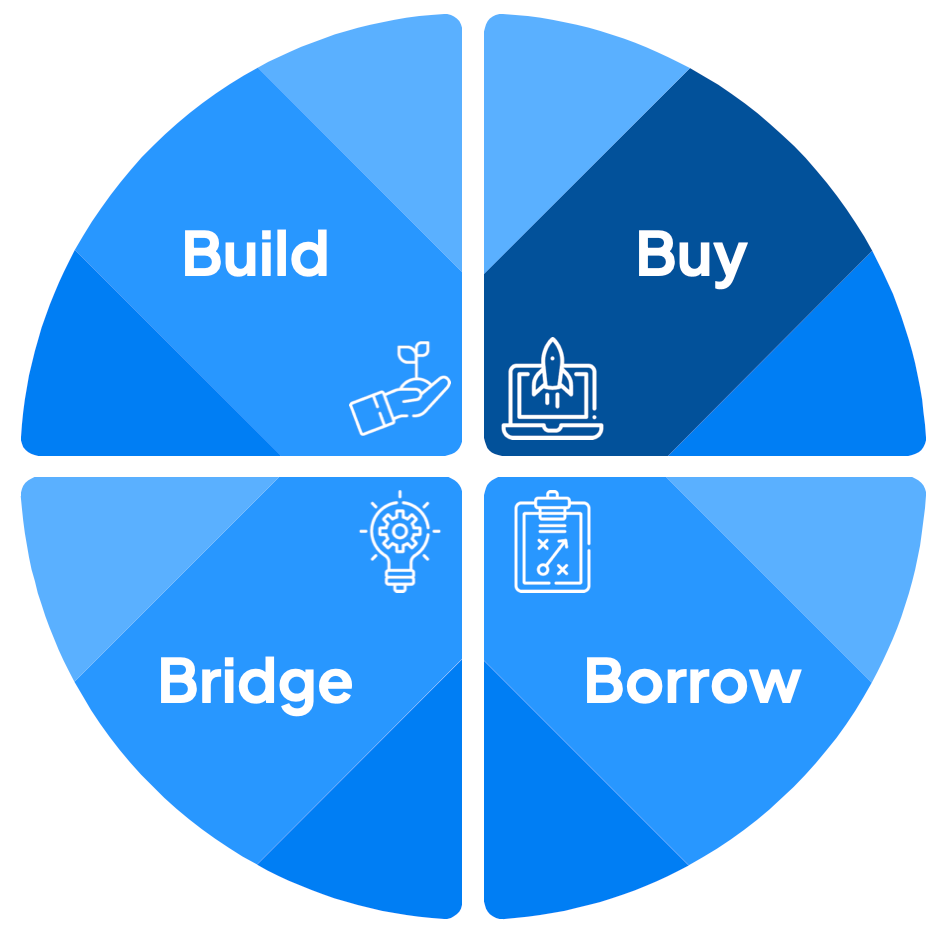
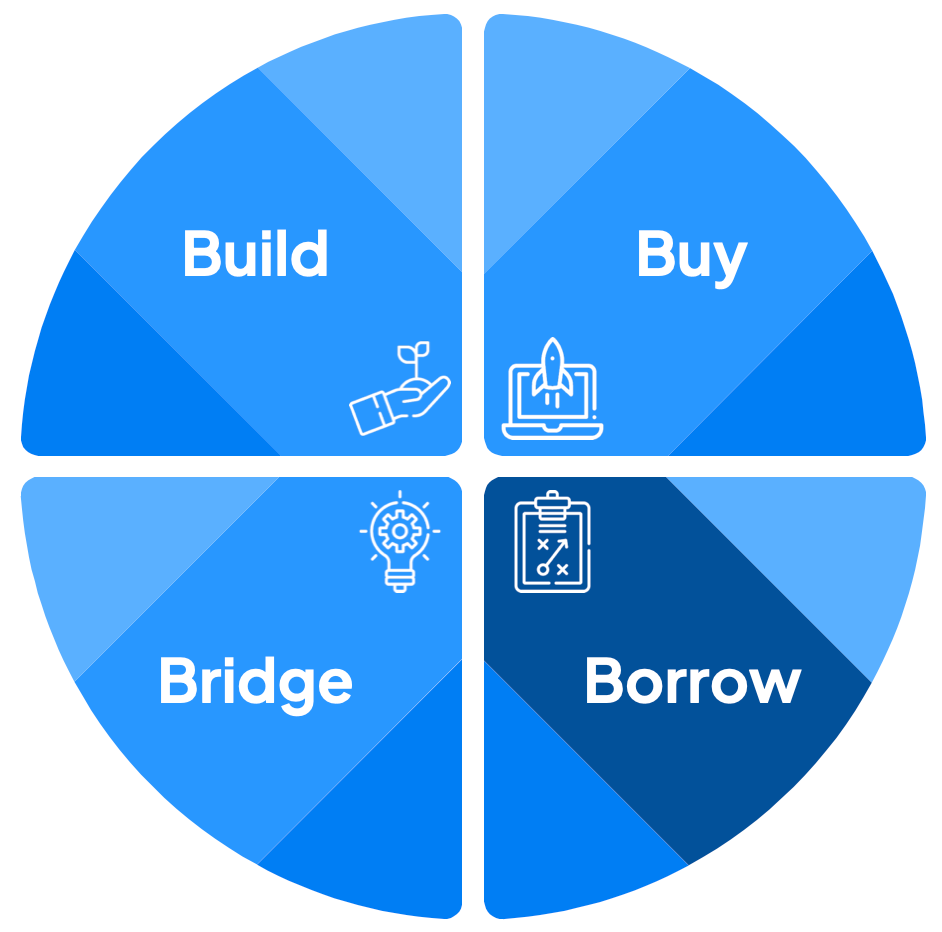
BORROW
Supplement your core team with part-time, freelance, agency or contract workers
BRIDGE
Support people as they move between roles, inside or outside the business
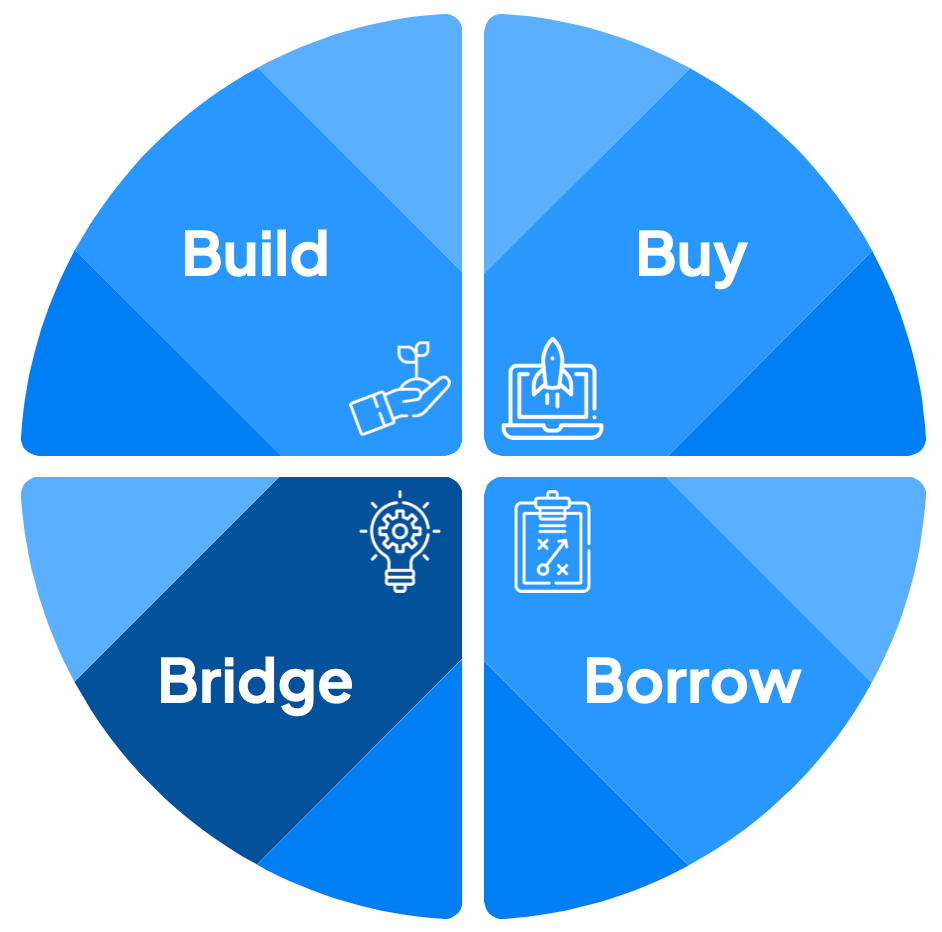
The 4B model for Experimentation
How does this apply to CRO and Data?
Your teams need a mix of the following:
Build: the enduring knowledge you need
Buy: the cutting-edge skills for hard problems
Borrow: surge capacity for complex launches, migration projects or new horizons
Bridge: to keeps teams motivated—offering transitions and movement rather than stagnation
What talent action are you mostly focussed on?
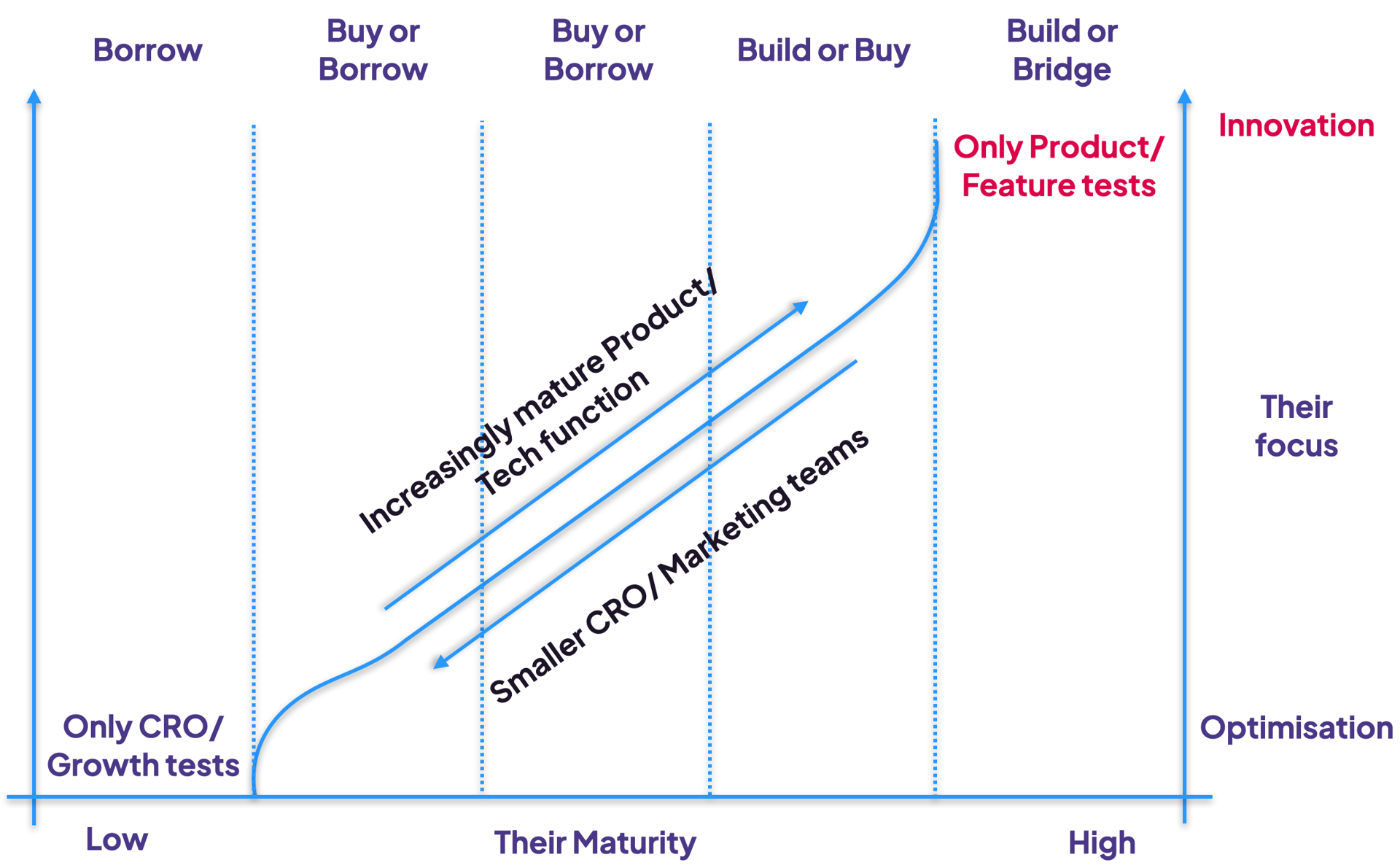
Is your client focussed on innovation pace or on faster optimisation?
Is their maturity ahead of yours or behind?
Summary
It’s not just “Build vs Buy” but the full range of options - you may need to borrow and bridge too
Context is key:
Are you BOTH aligned on the direction of travel for maturity?
What is their appetite for learning vs velocity?
Are they looking to increase their pace of innovation?
A good agency or partner will help you in-house the parts of the process it makes more sense for you to do yourself.
Please enter your details and we’ll email you the FREE Hypothesis Writing Guide and Experiment Canvas, plus a link to Ellie’s slides from the event
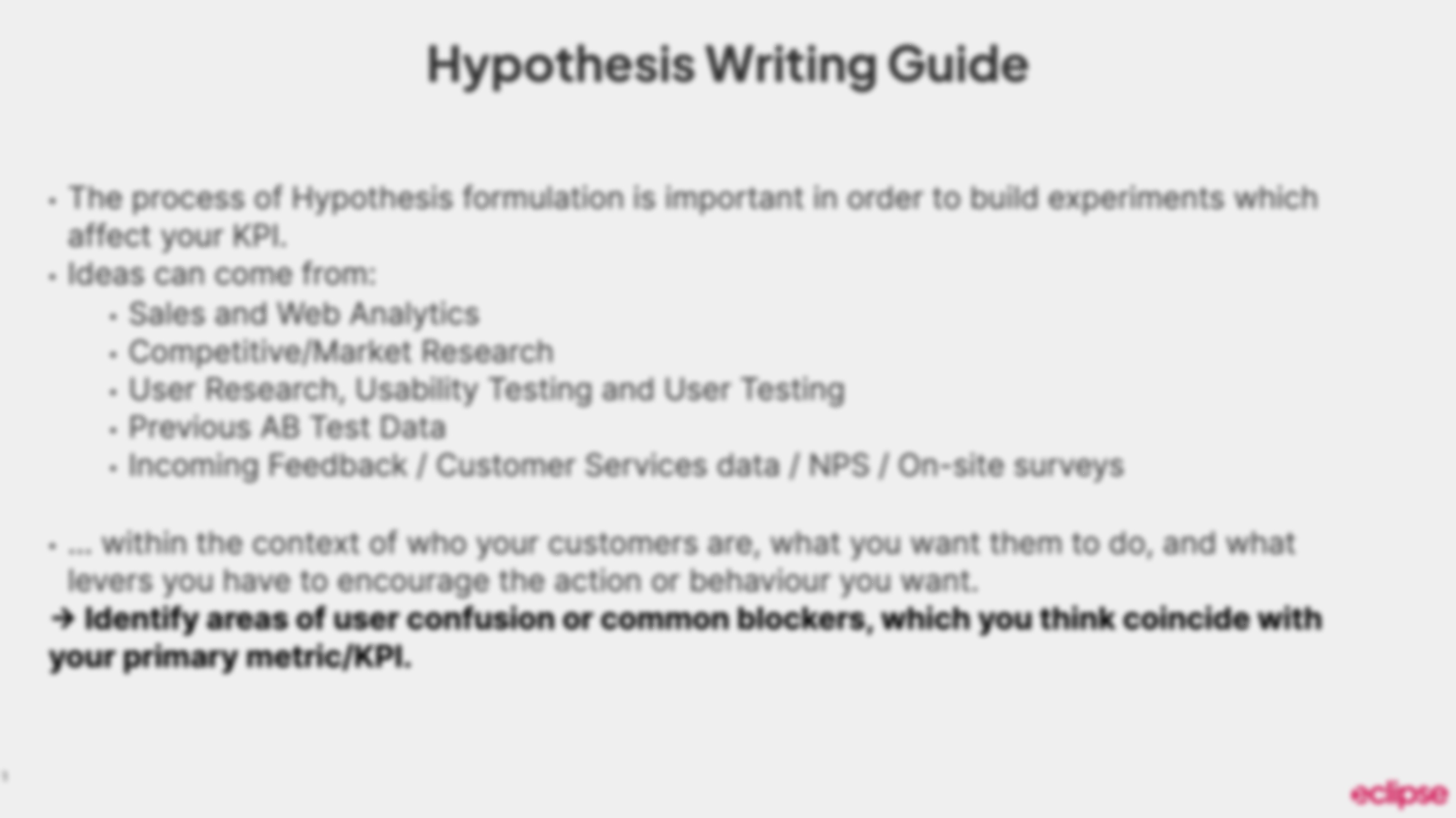
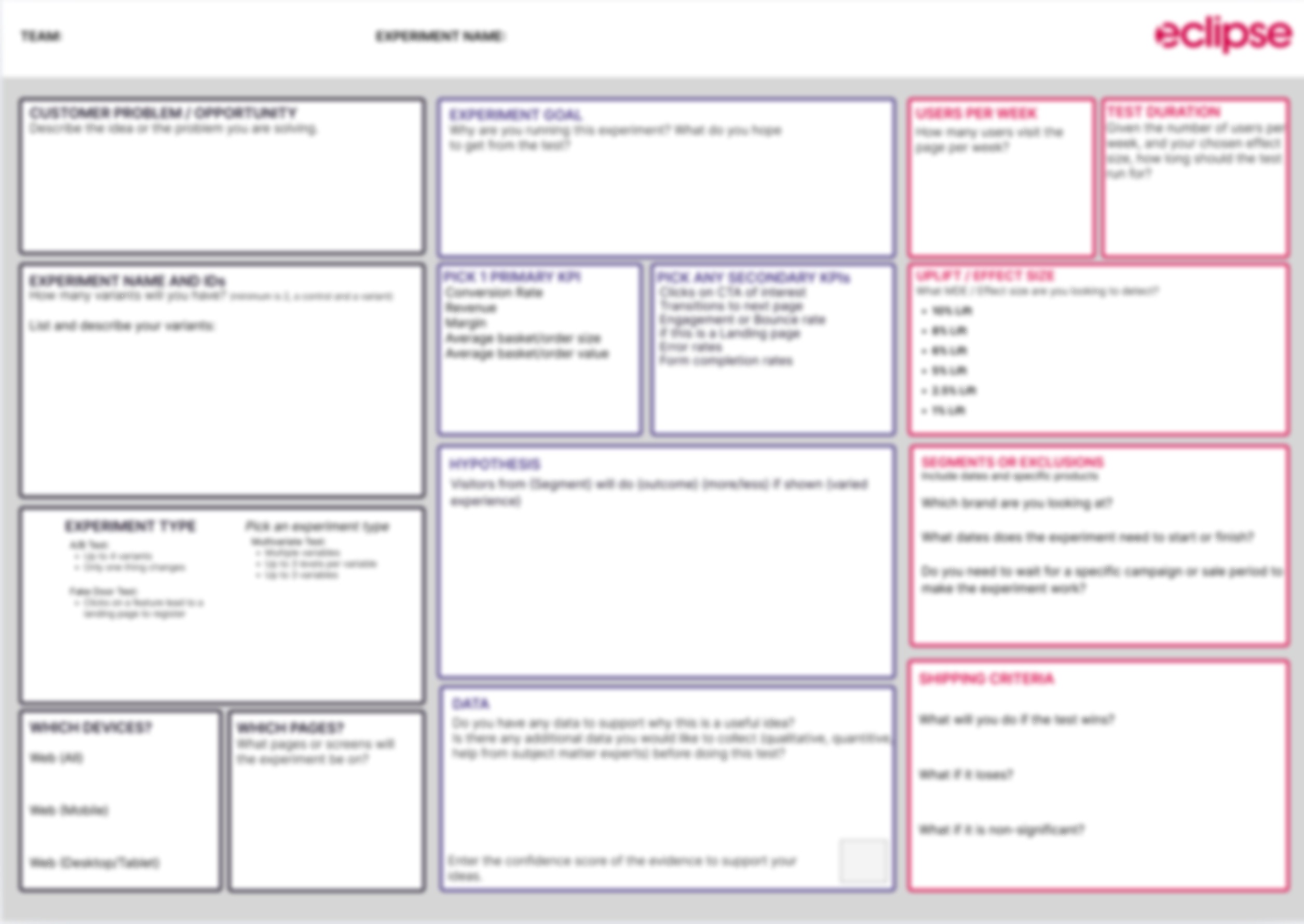
About Ellie
.webp)
If you enjoyed Ellie's talk or are making use of the resources here and want to know how you can implement them, please get in touch: connect with Ellie on Linkedin or use our contact form.
Ellie has over 13 years experience in the data and experimentation industry. In that time, she has helped businesses to ship experiments at scale, grow their data and product capability and create more value from their experimentation programme.She is the Head of Consulting at Eclipse, an experimentation-focussed agency in the UK.
